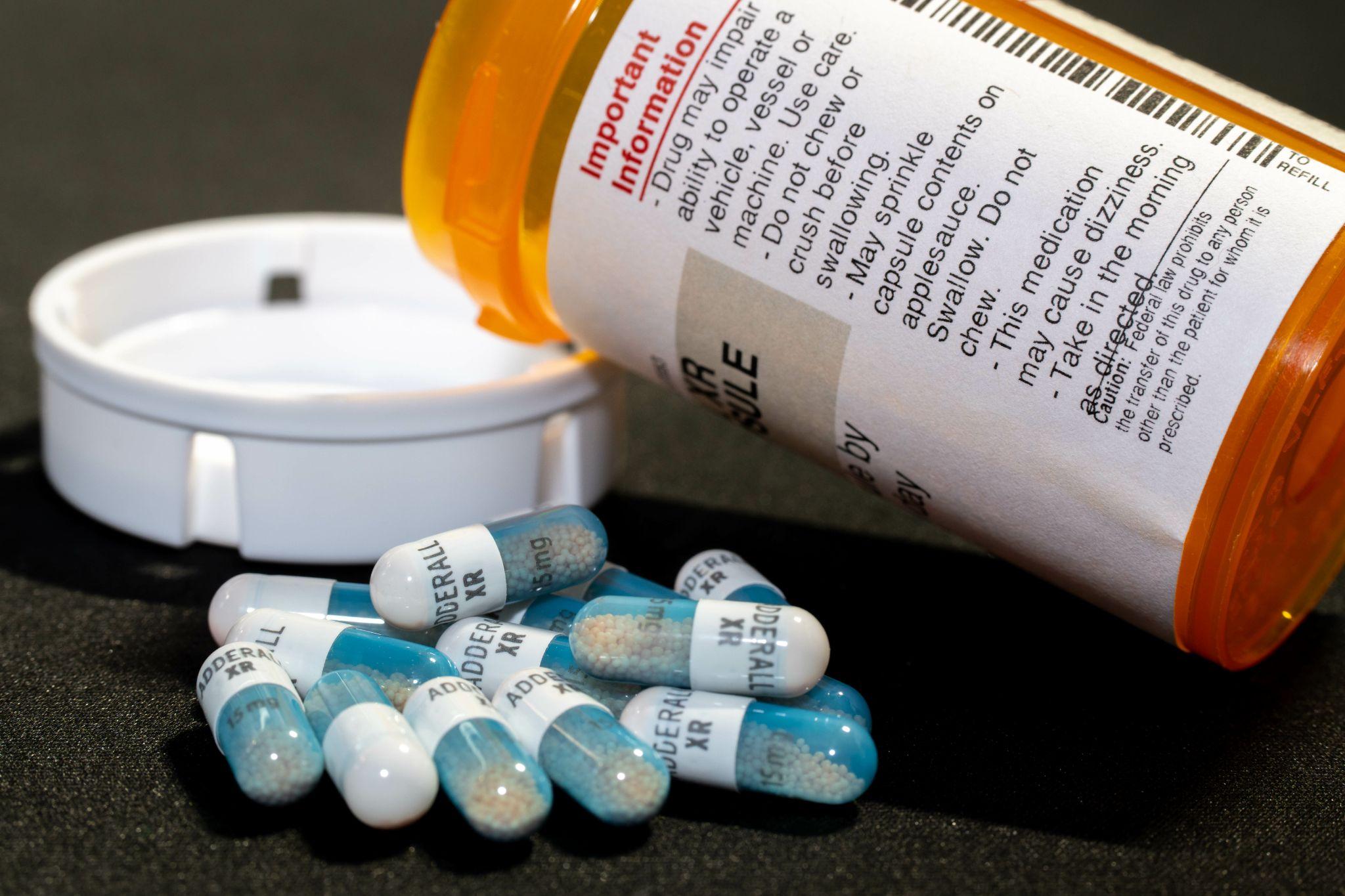Adderall is a prescription medication commonly used to treat attention-deficit/hyperactivity disorder (ADHD), based on criteria from the Diagnostic and Statistical Manual of Mental Disorders.
Its effectiveness in enhancing focus and productivity makes it not only a valuable therapeutic tool but also a substance with potential for misuse.
Explore the addictive nature of Adderall, providing insights for those who might be struggling with its use or for loved ones seeking to understand and help.
Components of Adderall
Adderall is more than just a popular medication for ADHD. It’s a Schedule II controlled substance, which means it is recognized as having a high potential for abuse. The drug is also a blend of two potent stimulants: prescription amphetamine and dextroamphetamine.
These stimulants increase the availability of neurotransmitters like dopamine and norepinephrine in the brain, enhancing focus, attention, and alertness. It’s commonly prescribed to individuals who have difficulty controlling their ADHD symptoms, helping them to achieve a better quality of life.
However, the way Adderall alters brain chemistry is also what lends to the potential misuse of the drug. When used correctly and under medical supervision, Adderall is safe and effective. But it’s this very effectiveness that can sometimes lead to its misuse.
The Addictive Potential of Adderall
As a stimulant, Adderall can indeed be habit-forming, particularly when used outside the bounds of medical guidance. The drug increases dopamine levels in the brain, a neurotransmitter associated with pleasure, motivation, and reward.
This chemical alteration can induce a sense of euphoria, especially when taken in higher doses than prescribed. It’s this euphoric effect that can lead to a psychological dependence on the drug, as users may seek to replicate that feeling.
The risk of developing a substance use disorder increases significantly when Adderall is used recreationally, which is common among college students, or by individuals for whom it was not prescribed. Also, the development of tolerance (where more of the drug is required to achieve the same effect) is a main indication of its addictive potential.
Recognizing Signs of Addiction
Recognizing addiction to Adderall involves a keen observation of various behavioral, physical, and psychological signs. These signs of Adderall addiction serve as a warning that immediate attention is needed.
Behavioral Changes
A significant indicator of addiction is a noticeable shift in behavior. This may include an increased preoccupation with obtaining and using Adderall, and neglecting social, occupational, or recreational activities once enjoyed. There might be a tendency to isolate from family and friends, especially if they are likely to express concern about the individual’s drug use.
Physical Symptoms
Physical symptoms are often telling signs of Adderall addiction. These may include noticeable weight loss due to decreased appetite, trouble falling asleep, irregular sleep patterns, and physical agitation or restlessness. Over time, individuals may also experience health issues like cardiovascular problems, headaches, and dizziness.
Psychological Signs
Psychological symptoms of Adderall addiction are often the most telling. These include increased anxiety, irritability, and mood swings. In severe cases, prolonged misuse can lead to symptoms of paranoia or hallucinations. A noticeable sign is the continuation of Adderall use despite being aware of its negative impact on mental health.
Tolerance and Withdrawal
Building a tolerance and needing larger doses of Adderall for the same effects is a clear sign of addiction. Alongside tolerance, withdrawal symptoms such as depression, fatigue, and a significant increase in appetite when not using the drug, are indicative of physical dependence.
Neglect of Responsibilities
Addiction often leads to neglecting important responsibilities. This could manifest as declining performance at work or school, neglecting household duties, or failing to meet family obligations due to Adderall use.
Risky Behavior
Engaging in risky behavior, such as driving under the influence of Adderall or using the drug in hazardous situations, is a common sign of addiction. Additionally, individuals might engage in risky activities to obtain the drug, such as buying it illegally or doctor shopping.
Risk Factors for Adderall Addiction
Individuals with a personal or family history of substance abuse are at a higher risk of developing an addiction to Adderall. This includes previous addiction to alcohol, illicit drugs, or prescription drugs.
The way Adderall is used significantly influences the risk of addiction. Using Adderall without a prescription or in ways not intended by a healthcare provider dramatically increases the risk.
Psychological factors play a role too. People dealing with stress, depression, or anxiety may turn to Adderall for temporary relief, inadvertently paving the way for addiction. Additionally, environmental factors such as peer pressure or being in settings where drug misuse is common can contribute to the development of an Adderall addiction.
Impact of Long-Term Use
The long-term use of Adderall, especially when misused, can lead to a host of health problems. Chronic use can cause cardiovascular issues, such as high blood pressure and increased heart rate, potentially leading to more severe conditions like heart attacks or strokes.
Mental health can also be significantly affected. Prolonged misuse may exacerbate underlying mental health disorders or lead to the development of new ones, such as depression, anxiety, or psychosis.
Cognitive impairments, including difficulty in concentrating and memory problems, can also occur. It’s important to recognize these risks and consult with healthcare professionals if such symptoms arise.
Getting Help

Seeking help for Adderall addiction is a crucial step towards recovery. The process often starts with professional counseling or therapy, which can address both the addiction and any underlying mental health issues.
Rehabilitation programs, both inpatient and outpatient, offer structured treatment and support. Joining support groups can provide a sense of community and shared experiences, aiding in the recovery process.
In some cases, medication-assisted treatment (MAT) may be appropriate, offering medical support to reduce withdrawal symptoms and manage cravings.
Prevention and Safe Use
Preventing Adderall addiction starts with its responsible use. This means strictly adhering to the prescription and guidance provided by healthcare professionals. Regular medical check-ups can help monitor the use of Adderall and its effects, allowing for adjustments in dosage or treatment as needed.
Education, through understanding the risks associated with Adderall and learning how to use it safely, is also a powerful tool in prevention. It’s also important for those prescribed Adderall to be open with their healthcare providers about their medical history and any other substances they are using. Creating an environment of awareness and open communication can significantly aid in the safe use of Adderall.
Find Out More About Adderall and Addiction With Lumina Recovery
Adderall, while an effective treatment for ADHD, carries the risk of addiction. Recognizing the signs of addiction, understanding the risks, and seeking help if needed are crucial steps.
Lumina Recovery offers detox programs, prescription drug addiction services, and medication-assisted treatment (MAT) to help those with an Adderall addiction.
Our team of professionals is ready to help you and your loved ones. Reach out today to learn more about steps toward recovery.
Disclaimer: This article is intended for educational purposes only and should not be taken as medical advice. If you or someone you know is struggling with Adderall use or addiction, please consult a healthcare professional for proper diagnosis and treatment.



